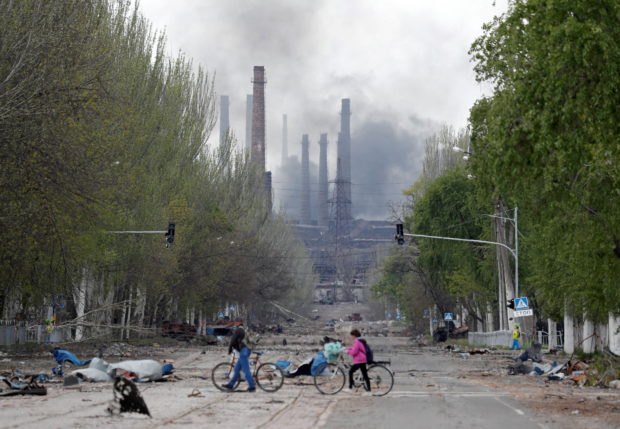EU plans Russian oil ban; Ukraine reports heavy eastern assault

People walk their bikes across the street as smoke rises above a plant of Azovstal Iron and Steel Works during Ukraine-Russia conflict in the southern port city of Mariupol, Ukraine May 2, 2022. (REUTERS)
KYIV/BRUSSELS – The European Union proposed its toughest sanctions yet against Russia on Wednesday, including a phased oil embargo, as Moscow pressed an offensive in eastern Ukraine and close Russian ally Belarus announced large-scale army drills.
Nearly 10 weeks into a war that has killed thousands of people and flattened Ukrainian cities, Russia was intensifying its assault, Ukraine’s defence ministry said, with attacks reported on railway stations used to transport Western arms.
A new convoy of buses began evacuating more civilians from the ravaged southeastern port city of Mariupol, which has seen the heaviest fighting of the war so far. Moscow pledged to halt some military operations this week to allow more evacuations.
Piling pressure on Russia’s already battered $1.8 trillion economy, Brussels proposed phasing out imports of Russian crude oil within six months and refined products by the end of this year.
“(President Vladimir) Putin must pay a price, a high price, for his brutal aggression,” European Commission chief Ursula von der Leyen told applauding EU lawmakers in Strasbourg.
Article continues after this advertisementThe plan, if agreed by all 27 EU governments, would follow U.S. and British oil bans and be a watershed for the world’s largest trading bloc, which remains dependent on Russian energy and must find alternative supplies.
Article continues after this advertisementU.S. President Joe Biden said he would speak to other Group of Seven leaders this week about possible further steps against Moscow. “We’re always open to additional sanctions,” Biden told reporters in Washington.
Ukraine’s Foreign Minister Dmytro Kuleba welcomed the news from the EU, but stressed the urgency of acting to starve Russia’s war machine.
“My position is simple: every euro paid to Russia for gas, oil or other goods ends up as rounds of ammunition in Ukraine to kill my compatriots,” he told Austrian TV channel Puls 4 in an interview.
The Kremlin said Russia was weighing various responses to the EU plan, adding that the measures would be costly for European citizens.
A source said EU envoys could reach a deal on Thursday or later this week on the plan, which also targets Russia’s top bank, its broadcasters, and hundreds of individuals.
‘WE ARE READY’
Russian Defence Minister Sergei Shoigu renewed a warning that Moscow would seek to hit U.S and NATO shipments of weapons into Ukraine.
His ministry said Russian forces disabled six railway stations used to deliver Western arms to Ukraine’s east. It later said it hit 77 military targets throughout the day, including ammunition depots and artillery.
Ukrainian authorities said Russian strategic bombers fired 18 rockets “with the aim of damaging our country’s transport infrastructure” and confirmed an attack on the railways.
Announcing surprise military drills, Belarus’s defence ministry said they posed no threat to neighbours, but Ukraine’s border service said it could not rule out that Belarusian forces might join Russia’s assault.
“Therefore, we are ready,” spokesman Andriy Demchenko said.
Some Russian forces entered Ukraine via Belarus when the invasion began on Feb. 24 but so far no Belarusian troops have been involved in what Moscow calls a “special military operation” to disarm Ukraine and defend its Russian-speaking population from fascists.
Kyiv and its Western supporters say Moscow’s fascism claim is a pretext for an unprovoked war of aggression that has driven more than 5 million Ukrainians to flee abroad.
The Kremlin on Wednesday dismissed speculation Putin would formally declare war on Ukraine and decree a national mobilisation on May 9, when Russia commemorates the Soviet Union’s victory over Nazi Germany in World War Two.
Putin is due to deliver a speech and oversee a May 9 military parade in Moscow’s Red Square.
‘TERRIBLY WORRIED’
The convoy leaving Mariupol, organised by the United Nations and the International Committee of the Red Cross, was heading for the Ukrainian-controlled city of Zaporizhzhia, Donetsk Governor Pavlo Kyrylenko said.
Russia’s military said it would pause military activity during the day on May 5, 6 and 7 to allow civilians to evacuate from the Azovstal steel works, where civilians and defenders are holding out against Russian forces that have seized the city.
Humanitarian corridors will be opened “for the evacuation of civilians (working personnel, women and children) whose presence in the underground facilities of the plant (has) been announced by the Kyiv authorities,” Russia’s military said.
The first evacuees from Azovstal arrived by bus in Zaporizhzhia on Tuesday after sheltering for weeks in bunkers beneath the sprawling Soviet-era complex.
Enjoying her first sun-drenched day after two months underground, evacuee Tetyana Trotsak said she could not stop thinking of those she believed were still stuck in a shelter they shared.
“I’m terribly worried about the civilians and wounded soldiers that are still there,” the 25-year old Mariupol power company employee said on Wednesday.
Ukrainian President Volodymyr Zelenskiy urged the U.N. to help rescue more people from Azovstal.
“The lives of the people who remain there are in danger. Everyone is important to us. We ask for your help in saving them,” Zelenskiy said in a statement to U.N. Secretary-General Antonio Guterres.
Russia now claims control of Mariupol, once a city of 400,000 but largely reduced to rubble after weeks of siege and shelling. It is key to Moscow’s efforts to cut Ukraine off from the Black Sea – vital for grain and metals exports – and link Russian-controlled territory in the south and east.
Alongside the eastern Donbas region, the southern coastline is Moscow’s key target after its troops failed to take capital Kyiv in the weeks after it invaded.